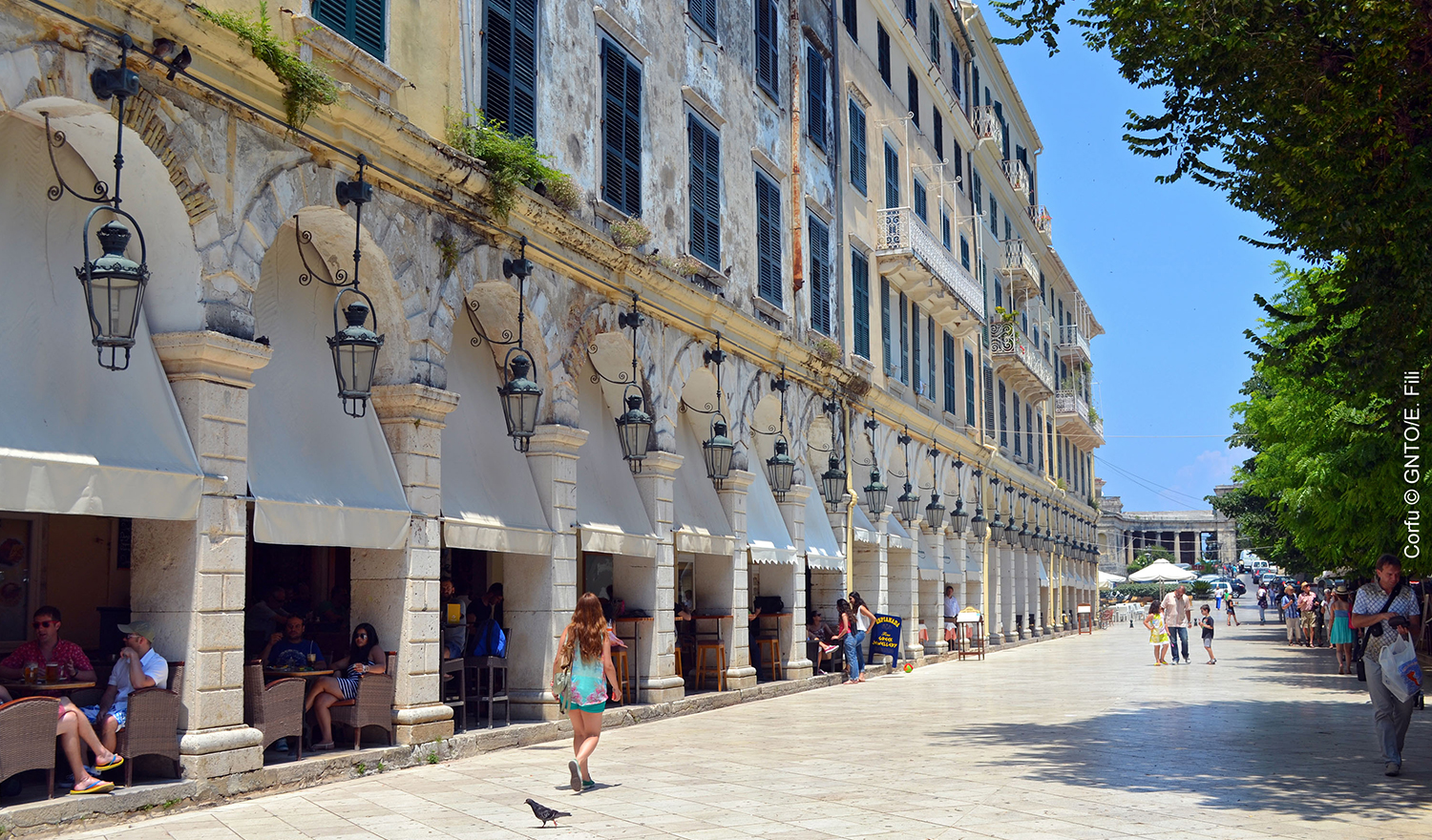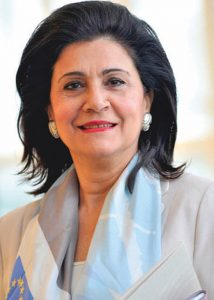
Dec 2019 Interview with Mrs. Rodi Kratsa Tsagaropoulou, Governor, Ionian Islands Region
Prisma Reports: The Ionian Islands is one of Greece’s 13th administrative regions, scattered off the western coastline of Central Greece and to the south of Peloponnese and comprising large and small islands, including Corfu of course, but also Ithaca, Paxos, Paxos, and many others. How would you present the Ionian islands region to the readers of Foreign Policy? Can you give us a rapid overview of the region, what are some of the most important economic sectors and industries?

Rodi Kratsa Tsagaropoulou, GOVERNOR, Ionian Islands Region
Rodi Kratsa Tsagaropoulou : The Ionian islands region is an insular region, blessed with a rich history and a generous natural environment. The region stands at a civilisation crossroad, of occidental civilisations which is different from the rest of Greece, which has been occupied by the Ottoman empire for four centuries. During this time, the Ionian islands have been occupied by Venetians, by the French, Russian and British. Therefore this part of Greece bears its own historical mark. This has given a certain type of character to the region and to its inhabitants. Our people are proud of this cultural diversity that has enriched them, and they are very open. This particular heritage is also visible in our architecture, in our music, in our painting which has a touch of renaissance, or in our iconography which mixes Byzantine and Renaissance art. The inhabitants of the Ionian islands however have never lost their Greek identity and have remained Orthodox Greeks. This is a paradox: to be open to other cultures, but at the same time maintain the national sentiment and the national religion. Furthermore it is noticeable that the Ionian islands weren’t part of Greece at the time of its insurrection but supported the country’s fight for independence .
Today the Ionian Islands region is very safe and doesn’t suffer from the geopolotical turbulences that affect the other part of Greece; we don’t have migrants for example. This is very important for tourism. We have an exceptional climate as well, with a quiet sea and no big winds. This makes it a perfect spot for maritime tourism.
The region includes both small and bigger islands. One of the big disadvantages that we have though is the lack of connectivity with the rest of Greece – nor air connectivity, nor sea connectivity. This impact our social cohesion with the rest of Greece.
Prisma Reports: How does the region contribute to the economy of Greece? How can it act as catalyst for further economic growth and investment in the country?
Rodi Kratsa Tsagaropoulou : The Ionian islands region is a major contributor to the Greek economy. We have registered constant progress, and constant touristic development that has contributed to enhancing not only our living standards but the revenues for the national economy, even during the crisis years.
Our biggest challenge now is to make our entrance into sustainable tourism. This is not only an imperative for our tourism and economy, but also a competitive advantage for our tourists, because what many are looking for is quality, a unique and modern positioning, and a focus on local culture and authenticity. All this had been sacrificed in the past as the Ionian islands are beach islands.
Prisma Reports: Can you give me some facts and figures to illustrate the importance of tourism in the various islands?
Rodi Kratsa Tsagaropoulou : We have been quite impacted by the Thomas Cook bankrupcy, as traditionnally we have many British viistors and this is our biggest market; yet our numbers are showing progress regardless.
Prisma Reports: What are the priorities in regards to tourism development and sustainable tourism development?
Rodi Kratsa Tsagaropoulou : One of our priorities it to increase tourism revenues and tourists’ spending. This is a complex and multidimensional process, that involves not only hyper-professionalisim, but also mind-openness also. We also need to enhance our natural production and agricultural products – including their categorisation as superior range, organic, etc. Our agricultural input used to be even more important than our tourism input. We do have some specific products here, and we can offer interesting and diverse products to all kind of tourists. And this is actually another point that I’d like to make: we haven’t really developed the diversification of our tourism market sources.
Prisma Reports: Precisely: one of the strategies to boost tourism is not only to boost arrivals, but also to boost tourist spendings. Amercian are a highly desired tourism group, having a much higher per capita spending rate than other tourists. What are your strategies to grow the region’s appeal for Amercian tourists and visitors in particular?
Rodi Kratsa Tsagaropoulou : American are indeed big spenders, and are an attractive market for us, especially in the cruise industry. We host many cruise ships here, but this is a segment that we wish to develop further in the future.
Prisma Reports: One of the flagship projects that is calling attention is the Kassiopi project in Corfu. After 6 years spent in bureaucratic hurdles, the project is finally restarted, with works scheduled to begin early next year. The project is set to create 1,000 new jobs during construction and 500 per year once completed. Can you give us a rapid tour of the project ? What is the master plan and how will the project contribute to Corfu´s touristic and economic development ?
Rodi Kratsa Tsagaropoulou : Kassiopi is still a controversed project here, as many local residents are against it. They think that Corfu needs to preserve its character and natural characteristics. They think this big investment will affect the natural settings of Corfu. Yet according to the Government the project has passed all the legislative requirements, and has gotten the national permission. Our laws are quite protective, so the fact that the project has been allowed is a good sign. Kassiopi should both help develop the region, while respecting the characteristics of the region and the local environment.
Prisma Reports: Aside from that, what other plans and strategies do you have in your pipeline to develop tourism infrastructure and grow the region’s appeal for international tourists and visitors?
Rodi Kratsa Tsagaropoulou : One of our targets is to bring to the market quality agricultural products. This goes at par with developping quality tourism: the idea is to bring to the island quality tourists who respect the environment, who most likely will understand the quality of our food products and look for it. That being said, our agricultural sector can have its own dynamic aside from from the tourism food product and tourism grastronomy.
Prisma Reports: Aside from the tourism and agricultural sectors which are a major part of your economy, are there any plans to develop other economic sectors and diversify your economic base? Which sectors might have potential to invest in in the region?
Rodi Kratsa Tsagaropoulou : There are lots of other segments to develop, like IT (although this is widely used in the tourism industry), research, industrial parks, etc. Those are also priorities. We want to attract engineers and scientists to come to Corfu.
Filming is another segment of interest for us. This is another priority of the national Government. The idea is not only to draw the interest of big producers and directors towards Greece, but to follow a regional strategy and encourage the regions to form their own strategies to attract the film industry, with all necessary services and facilities. Ionian islands has also made an entrance into this new segment of development and is trying to create a film office based in Corfu but with services in the various islands. Each islands needs to create its own structure to welcome this industry.
Prisma Reports: As a newly elected Governor for the Ionian islands, how would you summarize your visions and personal aspirations for the region?
Rodi Kratsa Tsagaropoulou : The Ionian islands have immense richness, which is our products and destination, and which we need to develop further. Today people are looking for specifics: they are after quality and singularities – and no longer after mass tourism. I believe that we can base our development on these trends: developing unique tourism and agriculture products, that are specific. We could be a laboratory for new processes to maintain our environment and our products.
Prisma Reports: What is your final message to the readers of Foreign Policy to conclude this interview?
Rodi Kratsa Tsagaropoulou : There are many reasons why to disover the Ionian islandsto: not only discover but truly experience and ‘live’ the Ionian islands. The Ionian islands are not only about holidays, but they are also a way of life.

Sorry, the comment form is closed at this time.